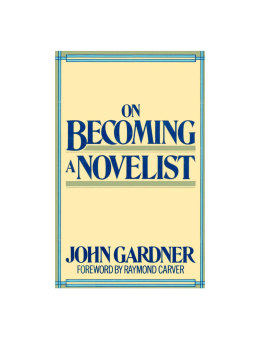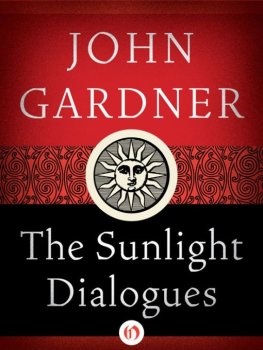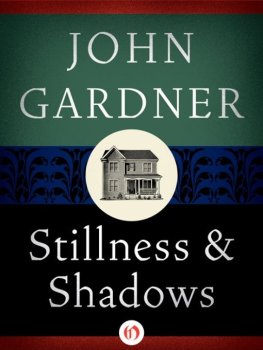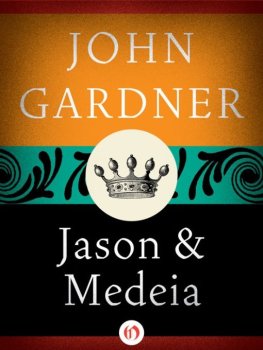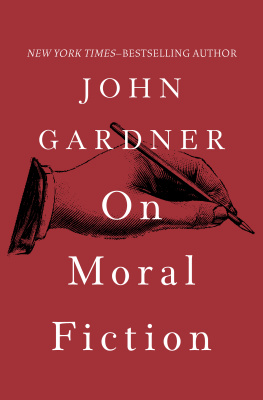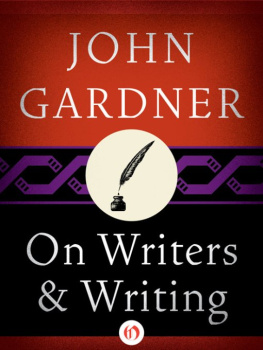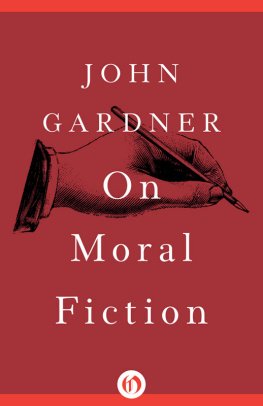John Gardner
The King's Indian: Stories and Tales
Book One. THE MIDNIGHT READER
1
I know pretty well what I look like in front of my congregation and how theyre disposed to think of me. Im not exactly dwarfish a man of medium stature but Im by no means as tall as I would have been if anyone had given me a vote in the matter. I do have the freedom to wear my whiskers and hair as I please, and despite the pursed lips of certain members of my congregation I wear them longish, really from vanity, though I once preached a sermon which I think was true, as a metaphor at least, on my beard in relation to conformity, the death of religion. John the Baptist, I soberly observed, lived far from town as a religious ascetic, and society said, Hes crazy. Jesus, on the other hand, enjoyed people, all kinds of people, and society called him an encourager of immorality. Any denominational executive could have told them both that their behavior was stupid; things would be ever so much better with the church if John would merely comb his hair and Jesus would try to be a little more discreet. But however that may be, I do not deny that my square black beard and the curls at my collar are to me a compensation for my failure to reach six feet. I stand, by habit, somewhat stooped; I must have recognized in early adolescence that I was locked forever from the joys of imposing height. But my shortness, my stoop, are not the worst of it. My gestures come more from my mother than from my father, a thing not especially unusual in my trade, but offensive to me just the same. Between genes and my early environment my mothers love Im not left much room to move around in. Very well to read Spinoza and Tillich on Free Will. I am, for all their philosophy, disadvantaged. All this passes through my mind sometimes when Im lecturing my flock, and I smile suddenly, to their consternation. Actually, I am richly blessed, it occurs to me. My failure to look truly distinguished keeps me honest, keeps me Christian. However righteous, however learned my explication of the Biblical texts, I cant forget that by ideal standards were all of us silly-looking, witless geese; wed better be kind to each other and trust in the Lord. So I stand, somewhat precariously balanced, on the footstool hidden behind my pulpit, and I gesture with my long white fingers like a lady choir director, and I give them the Word.
I tell them mainly, in a thousand different ways, the secret of shaking their foolish gloom, their dreadful and regular depression about things. They do not understand in the least what theyre here for. The institutional church is not the church at all, I say to them, but a foul encrustation, a birthday party for a man whos left town and forgotten to leave us a forwarding address. I read them scripture: And the Lord said through his prophet Amos, I hate and I despise your feasts, and I take no delight in your solemn assemblies. Take away from me the noise of your songs; to the melody of your harps I will not listen. But let justice roll down like waters, and righteousness like an ever-flowing stream. They are troubled by this, and they know where I mean to take them with it. To the crisis in the church, the weather-beaten sign on my office wall, THE CHURCHES OF CARBONDALE WELCOME YOUmemento (mori) from the good old days, when building buildings was the glorious mission, which first meant building congregations, pulling in dollars, shanghaiing in the lame and halt, the fat-cat self-complacent and the crazy, letting them imagine that the purpose of the church is social respectability, support of the government, perpetuation of the old traditions, the proper maintenance of graveyards real and symbolic. They know I will bring up the churchs involvement with William Sloane Coffin and the peace movement, John R. Fry and the urban poor. They compress their lips, avoid my eyes, and look miserable. Some of the staunch in my little congregation are nervously wiping their sweaty hands in their handkerchiefs. That above all brings trouble from the pulpit. I will tell them the Christian message is one of exuberant joyChristianity is a wide, smooth street where all the lights are green, I say. But how can my people believe such things? Not Christian worshipers but infiltrators, people never even informed about the strange Christian theory.
I wax eloquent, smile, show my large square teeth. I think of the stubborn, stupid sheep of Palestine, Christs comic metaphor for all of us, and I butt them with quotations, roll my eyes, look wildly alarmed for no clear reason. Cheer up! I tell them. God loves you, crazy as it seems! I can hardly be surprised at their uncertainty. The older members of the congregation came up through a church that no longer exists, a church ruled mainly by spiritual guides who in the privacy of their sterile cells rolled frightened eyes and bleated in vain for the spirit, terrified by Hell. You encounter them yet, those clerical antiques: leftover dinosaurs angrily, confusedly hunting for the herd; mock saints in mortification chains; collectors of offerings for stained-glass windows. (Surely God loves, if not us, stained glass.) Against their influence I prate and howl and hoot.
One of my favorite wealthy conservatives, I tell them, financed an edition of the letters written by pastors in Geneva during the period of Calvins dominance. He thought they would show the churchs distaste for political involvement. What they showed was that these early Calvinists were actively plotting the overthrow of the French government. I tell them, with ecstatic joy, of the revolutionary Wesley.
They look miserable. Hopelessly, absurdly unredeemed. The first four rows are completely empty. There are only four people, as usual, in the fifth Dr. Grewy, who is for some reason my friend; Professor Watson, from the university, who has heard everything and maintains a coolly professional disinterest; his wife, whose present affair is with a dentist and who comes to talk with me three times a week; and old Elbert Finch, stone-deaf but a creature of rockfirm habit a virtue I profoundly admire, though not a Christian virtue. In the rows beyond sit the clustered remains of the crisis. Once again I praise God for my ridiculousness. If I werent ridiculous balanced (vanitas) on my pulpit stool I might easily grow scornful, indifferent to these people. And if my pitiful flock were not confused and unhappy, they would joyfully go out into the world and leave my church empty. We need each other. I give them a vision they only half understand, a vision vaguely exciting, though alarming. I explain for them words in Greek and Hebrew and they frown, beginning to perceive. One day, it comes into my mind for an instant, they will suddenly get it, and theyll rise as one man and shout Hosanna! and Ill become supererogatory. Hastily I toss in something to confuse them: kheseth, the Hebrew for Gods steady love. The Hebrews, I tell them, lived in a much less comfortable world than ours, and they assumed that pain and death were to be expected. For them, any break in the flow of pain was a matter for remark; the mere fact of survival was a miracle. Then hurriedly, slyly, I wind it up. Thank God therefore for his goodness! They purse their lips, give me a glance up-from-under like a bull, and bow their heads. I notice, near the back, a face I havent seen before a rather ghostly face, bearded, prophetically staring. He does not bow with the rest for the benediction. I lose my place, hesitate, repeat myself.
2
As I stand at the back of the somber, dark-beamed church shaking hands, the smell of furniture polish all around me, the church windows burning with autumnal light, my people become individuals once more, as I too become individual. Im used to this change and approve of it, though it baffled me some, when I was younger made me doubt my authority. I would not say to them, individually, the things I have told them the things I have been free to tell them from the pulpit. Poor old Miss Ellis, the piano teacher, whose house is crammed with massive, ornately carved furniture from Burma, where a dear, dear friend (I have never heard the dear friends name) was a missionary. Miss Ellis hates Communists, destroyers of temples, and she does not like it that Jesus was killed for suspected revolutionary activities. Her bosom heaves and her blue eyes blink tears when she speaks of Foreign Missions. Once when a novelist from Kenya spoke to the Ware Class, gently but firmly explaining to those venerable ladies that the chief effect of Foreign Missions has been to soften up ancient cultures for colonialism and capitalistic exploitation, Miss Ellis nearly had a heart attack. Her mouth gaped, her face went pale beneath the paint and powder, her small, liver-spotted hands pressed hard against her heart. She was indignant, outraged, the man was an ungrateful beast. An animal! Miss Ellis spoke with tender passion of her friends dedication. The man from Kenya was sympathetic, the soul of courtesy (although a heathen). He did not mean that missionaries were aware of their effect. They were saints; no one who had watched them could deny it. But their effect in Africa was history. Miss Ellis left the meeting shaking, prepared to cancel her pledge because wed invited such a man. But three days later she sat weeping in my office. She was lost. The world was meaningless. She told how her mother, all her life, had given every spare penny to the Missions. It did not matter that Miss Ellis had done the same. It was not her own waste that broke her heart. She had her music, at least. But her mother had meant to do good in the world a generous, warm-hearted, love-filled woman: Everyone who ever knew her had been devoted to her. Think of it, she whispered. There was terror in her eyes, an emptiness dark as what astronomers call the coal-pocket. Think of her lying there, in her grave in Philadelphia, and her whole life






